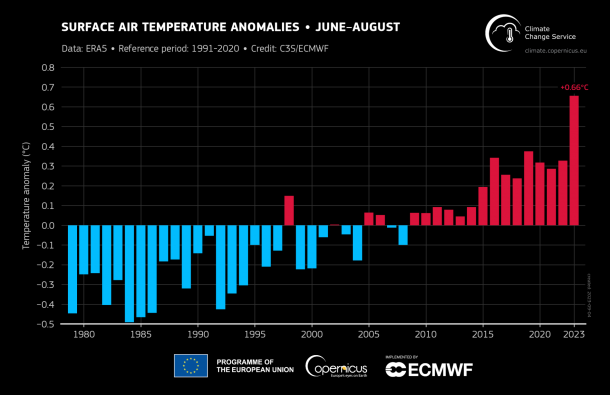You know things are serious when the UN Secretary General Antonio Guterres escalates the rhetoric. On 6th September he commented on the latest World Meteorological Organisation report saying that Climate Breakdown has begun.
"The dog days of summer are not just barking, they are biting.
"Our planet has just endured a season of simmering — the hottest summer on record. Climate breakdown has begun.
"Scientists have long warned what our fossil fuel addiction will unleash. Our climate is imploding faster than we can cope with extreme weather events hitting every corner of the planet.
"Surging temperatures demand a surge in action. Leaders must turn up the heat now for climate solutions. We can still avoid the worst of climate chaos — and we don’t have a moment to lose."
The World Meteorological organisatuion (WMO) reported that Earth had its hottest three-month period on record, with unprecedented sea surface temperatures and much extreme weather. Key points:
- Global sea surface temperatures are at unprecedented highs for the third consecutive month
- Antarctic sea ice extent remains at a record low for the time of year.
- Hottest August on record – by a large margin – and the second hottest ever month after July 2023,
- August as a whole is estimated to have been around 1.5°C warmer than the preindustrial average for 1850-1900, according to the C3S monthly climate bulletin.
- The year so far (January to August) is the second warmest on record behind 2016, when there was a powerful warming El Niño event.
- Sea surface temperatures: August as a whole saw the highest global monthly average sea surface temperatures on record across all months, at 20.98°C. Temperatures exceeded the previous record (March 2016) every single day in August.
- Antarctic sea ice extent: remained at a record low level for the time of year, with a monthly value 12% below average, by far the largest negative anomaly for August since satellite observations began in the late 1970s.
- Arctic sea ice extent was 10% below average, but well above the record minimum of August 2012.
- 98% likelihood that at least one of the next five years will be the warmest on record and a 66% chance of temporarily exceeding 1.5°C above the 1850-1900 average for at least one of the five years, according to a report in May from WMO and the UK's Met Office. This does not mean that we will permanently exceed the 1.5°C level specified in the Paris Agreement which refers to long-term warming over many years.
In a second media release the WMO said that "Climate change is increasing the intensity and frequency of heatwaves. This extreme heat, compounded by wildfires and desert dust, is having a measurable impact on air quality, human health and the environment, according to a new report from the World Meteorological Organization (WMO)."
The report shows how heatwaves triggered wildfires in the northwestern United States and heatwaves accompanied by desert dust intrusions across Europe both led to dangerous air quality in 2022. It also includes case studies from Brazil on how parks and tree-covered areas within cities can improve air quality, absorb carbon dioxide and lower temperatures, thus benefiting inhabitants.
“Heatwaves worsen air quality, with knock-on effects on human health, ecosystems, agriculture and indeed our daily lives,” said WMO Secretary-General Prof. Petteri Taalas. “Climate change and air quality cannot be treated separately. They go hand-in-hand and must be tackled together to break this vicious cycle,” he said.
“This Air Quality and Climate Bulletin relates to 2022. What we are witnessing in 2023 is even more extreme. July was the hottest ever month on record, with intense heat in many parts of the northern hemisphere and this continued through August,” he said.
“Wildfires have roared through huge swathes of Canada, caused tragic devastation and death in Hawaii, and also inflicted major damage and casualties in the Mediterranean region. This has caused dangerous air quality levels for many millions of people, and sent plumes of smoke across the Atlantic and into the Arctic,” said Prof. Taalas.
“Heatwaves and wildfires are closely linked. Smoke from wildfires contains a witch’s brew of chemicals that affects not only air quality and health, but also damages plants, ecosystems and crops – and leads to more carbon emissions and so more greenhouse gases in the atmosphere,” says Dr Lorenzo Labrador, a WMO scientific officer in the Global Atmosphere Watch network which compiled the Bulletin.
References:
UN Press, 6 SEPTEMBER 2023, Climate Breakdown Has Begun with Hottest Summer on Record, Secretary-General Warns, Calling on Leaders to ‘Turn Up the Heat Now’ for Climate Solutions https://press.un.org/en/2023/sgsm21926.doc.htm
WMO, 6 September 2023, Earth had hottest three-month period on record, with unprecedented sea surface temperatures and much extreme weather https://public.wmo.int/en/media/press-release/earth-had-hottest-three-month-period-record-unprecedented-sea-surface
WMO, 6 September 2023, WMO Bulletin: heatwaves worsen air quality and pollution https://public.wmo.int/en/media/press-release/wmo-bulletin-heatwaves-worsen-air-quality-and-pollution



No comments:
Post a Comment